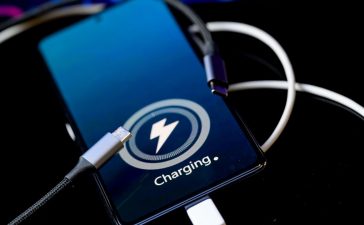Deep brain stimulation delivered without the need for surgery could improve symptoms of memory loss in people with Alzheimer’s disease, pioneering research suggests.
The treatment usually involves making small holes in the skull to implant electrodes into the brain tissue.
But scientists have developed a method, known as temporal interference, which uses a headset to apply differing frequencies of electrical field through electrodes.
The overlapping electrical fields target stimulation towards the brain’s hippocampus, a region which plays a key role in learning and memory.
Experts at the UK Dementia Research Institute (UK DRI) trialled the treatment in 20 healthy volunteers while they carried out tasks that involved remembering pairs of faces and names.
READ MORE: Alastair Stewart talks ‘dramatic’ first sign which led to dementia diagnosis
Brain scans that looked for changes in blood flow showed the stimulation affected hippocampal activity. Memory accuracy was improved after 30 minutes of treatment.
Study leader Dr Nir Grossman, of the UK DRI Institute at Imperial College London, said: “Until now, if we wanted to electrically stimulate structures deep inside the brain, we needed to surgically implant electrodes into the brain, which of course carries risk for the patient and can lead to complications.
“With our new technique we have shown for the first time that it is possible to remotely stimulate specific regions deep within the human brain without the need for surgery.
“This opens up an entirely new avenue of treatment for brain diseases like Alzheimer’s which affect deep brain structures.”
Deep brain stimulation is already used to treat movement disorders such as Parkinson’s, tremor and dystonia. The team is now trialling their new non-invasive technology in patients with early stage Alzheimer’s disease.
Dr Grossman added: “We hope that this will restore normal brain activity in the affected areas, which could improve symptoms of memory impairment.”
Luca De Freitas, 24, was one of the healthy volunteers who took part in the study. He said it was painless and he felt calm as the electrical fields were applied.
Luca added: “I work for a company which produces diagnostics for dementia, so I was really keen to take part in the study to help advance research in this area.”
Dr Richard Oakley, associate director of research and innovation at Alzheimer’s Society, hailed the “incredible technology”.
He said: “Currently, treatments that stimulate areas deep in the brain are used in Parkinson’s disease, but this involves invasive surgery which can take months to recover from.
“This study shows that it is possible to do deep brain stimulation simply by wearing a headset. What’s more, this stimulation can improve performance in memory tasks in healthy people.
“Thanks to Alzheimer’s Society’s research network, people living with dementia were able to give the technology a test-run, resulting in the researchers improving the headset’s comfort, and making it possible to be worn at home rather than just in the clinic.”
Dr Oakley added that it was exciting to see new research avenues open up for potential treatments but it was “still very early days”.
“We’re looking forward to seeing how the study develops, particularly how long-lasting the changes could be for people living with Alzheimer’s disease,” he said.
This method of deep brain stimulation was first described by a team at Imperial College London, who showed in 2017 that it could work in mice.
It will also allow scientists to investigate the functional roles of different deep brain regions for the first time by stimulating them.
Dr Ines Violante, a senior lecturer in psychological neuroscience at the University of Surrey, said: “The ability to selectively target deep brain areas of the brain using a non-invasive approach is very exciting as it provides a tool to investigate how the human brain operates and opens possibilities for clinical applications.
“The combination of non-invasive imaging and brain stimulation will help us unravel the processes that support our cognitive functions, such as memory and learning.
“Knowledge of these processes and how they can be altered is essential to develop better individualised strategies to treat or delay the onset of diseases.”
Dr Joanna Latimer, head of neuroscience and mental health at the Medical Research Council, said new treatments for Alzheimer’s were desperately needed.
She added: “Memory impairment is a key feature of the disease and these initial results present an innovative treatment option for people diagnosed with Alzheimer’s.
“The results from the next stage of this highly promising treatment cannot come fast enough, and reaffirm the importance of the commitment the MRC has made to support the UK DRI and its role in advancing dementia research.”
The findings were published in the journal Nature Neuroscience.









